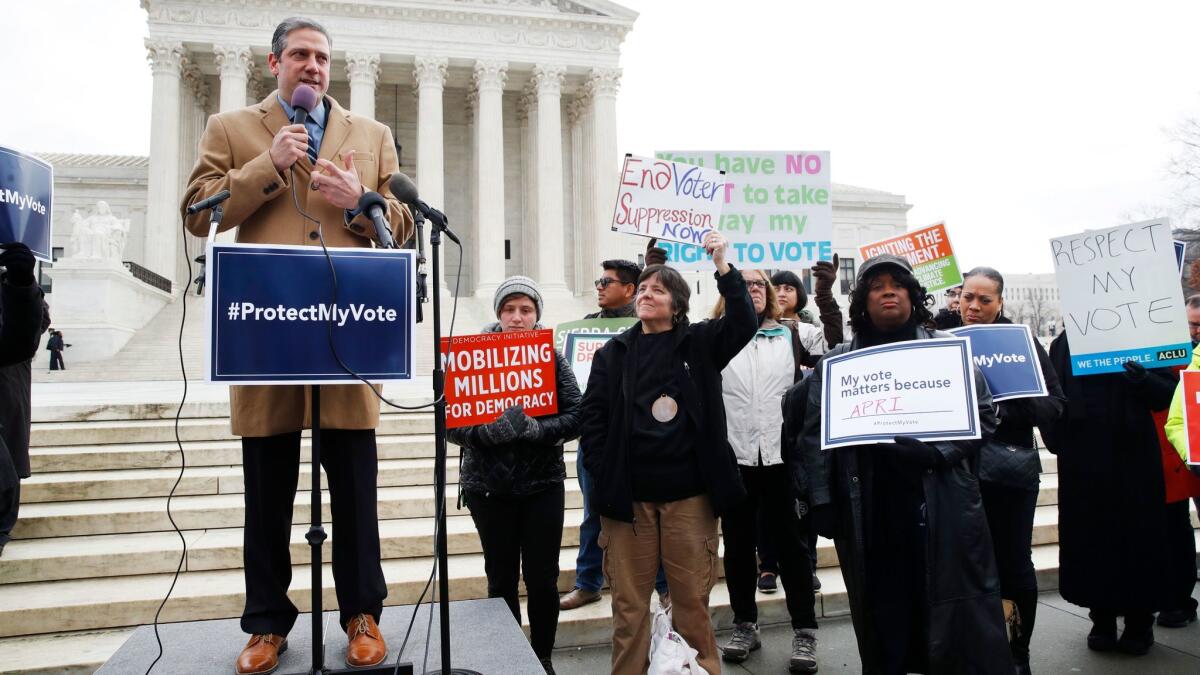Supreme Court justices appear divided over Ohio rule to remove people from rolls who don’t vote

- Share via
Reporting from Washington — The Supreme Court sounded closely split Wednesday in a potentially far-reaching election-law dispute over whether Ohio and other states may remove voters from the rolls who have not voted in two elections and have failed to respond to a notice in the mail.
Civil rights lawyers said such “purges” have wrongly removed tens of thousands of legal voters from the rolls, even though the states had no evidence they had moved or died. They argued the practice violates the federal Motor Voter Act, which made it easier for Americans to register to vote and barred states from removing them “by reason of the person’s failure to vote.”
The 1993 law was designed to end what was called the “use it or lose it” policy for voting. Previously, many states had regularly removed voters from the rolls if they failed to cast a ballot over several election cycles.
But civil rights advocates said those policies are making a comeback in an era when Republicans regularly sound the alarm over alleged voter fraud. Outdated, inaccurate voter rolls could, in theory, lead to casting ballots on behalf of dead people or former residents.
Ohio has been particularly aggressive about removing inactive voters from the rolls, according to the League of Women Voters. A federal appeals court ruled its removal policy violated federal law.
But the justices agreed to hear the state’s appeal, and its leading conservatives said Wednesday they saw the state’s policy as reasonable. Chief Justice John G. Roberts Jr. and Justices Anthony M. Kennedy and Samuel A. Alito Jr. noted the federal law also said states may “make a reasonable effort to remove the names of ineligible voters.”
Kennedy said states are “purging them [because] they want to protect the voter roll from people who have moved, and they’re voting in the wrong district. We’re talking about the best tools to implement that purpose.”
An attorney for the civil rights plaintiffs said that sending a notice in the mail is clearly not the best tool. About 70% of the recipients do not respond, he said, but the state sees this as evidence they have moved. Instead, they could check the state’s DMV offices, which requires drivers to update the registration within a month of moving.
He agreed that a letter returned undelivered would suggest the voter had moved. But a notice from the election board “that doesn’t get returned tells them nothing,” said attorney Paul Smith.
The chief justice disagreed. “It doesn’t tell them nothing. It tells them that they did not respond to a notice that says you’re going to lose the registration if you don’t vote through two elections. So it tells them something.”
The Trump administration’s Solicitor Gen. Noel Francisco argued in support of Ohio and said Congress gave “states the flexibility they need” to cope with what he called “overinflated” or “bloated voter rolls.”
But he ran into sharply skeptical questions from two of the court’s liberals. Justices Sonia Sotomayor and Elena Kagan said the federal law made clear that voters may not be removed from the rolls based on the fact they did not vote in one or more elections. Sotomayor said Americans have a “right not to vote.” She noted that millions of voters typically sit out the midterm elections but vote in presidential election years.
Last year, the Justice Department under President Trump switched its position in the Ohio case. Since the 1990s, the government had said the 1993 law did not permit states to remove voters from the rolls because they failed to cast a ballot in one or more elections.
Sotomayor asked for an explanation. It “seems quite unusual that your office would change its position so dramatically,” she told Francisco.
He said the law passed by Congress “reflects a balance” so that voters could easily register but states also could manage the rolls.
Lawyers for the ACLU and other civil rights groups said the state rules disproportionately affect minority and low-income voters. They cited reports from Cleveland and Cincinnati, where tens of thousands of people had their registrations canceled.
“To suggest that voting is somehow now a ‘use it or lose it’ proposition disrespects voters and undermines the entire purpose of the National Voter Registration Act,” Sherrilyn Ifill, president of the NAACP Legal Defense Fund, said in a statement. She said the 1993 “was explicitly designed to expand the voting rolls.”
Voting has become an increasingly partisan issue in the last decade, with Republicans arguing for stricter standards for registering and casting a ballot and Democrats preferring to make the process easier for citizens.
If the justices side with Ohio in Husted vs. A. Philip Randolph Institute, other states are likely to follow the state’s lead. Lawyers for 17 Republican-led states filed briefs in support of Ohio; California and 11 other Democratic-led states joined in support of the civil rights plaintiffs.
On Twitter: DavidGSavage
UPDATES:
1:40 p.m.: This article was updated with additional reaction and quotes from the justices.
This article was originally published at 9:45 a.m.
More to Read
Get the L.A. Times Politics newsletter
Deeply reported insights into legislation, politics and policy from Sacramento, Washington and beyond. In your inbox twice per week.
You may occasionally receive promotional content from the Los Angeles Times.











